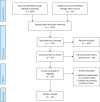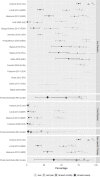How often do general practitioners use placebos and non-specific interventions? Systematic review and meta-analysis of surveys
- PMID: 30142199
- PMCID: PMC6108457
- DOI: 10.1371/journal.pone.0202211
How often do general practitioners use placebos and non-specific interventions? Systematic review and meta-analysis of surveys
Abstract
Background: In a systematic review and meta-analysis we summarize the available evidence on how frequently general practitioners/family physicians (GPs) use pure placebos (e.g., placebo pills) and non-specific therapies (sometimes referred to as impure placebos; e.g., antibiotics for common cold).
Methods: We searched Medline, PubMed and SCOPUS up to July 2018 to identify cross-sectional quantitative surveys among GPs. Outcomes of primary interest were the percentages of GPs having used any placebo, pure placebos or non-specific therapies at least once in their career, at least once in the last year, at least monthly or at least weekly. Outcomes were described as proportions and pooled with random-effects meta-analysis.
Results: Of 674 publications, 16 studies from 13 countries with a total of 2.981 participating GPs (range 27 to 783) met the inclusion criteria. The percentage of GPs having used any form of placebo at least once in their career ranged from 29% to 97%, in the last year at least once from 46% to 95%, at least monthly from 15% to 89%, and at least weekly from 1% to 75%. The use of non-specific therapies by far outnumbered the use of pure placebo. For example, the proportion of GPs using pure placebos at least monthly varied between 2% and 15% compared to 53% and 89% for non-specific therapies; use at least weekly varied between 1% and 3% for pure placebos and between 16% and 75% for non-specific therapies. Besides eliciting placebos effects, many other reasons related to patient expectations, demands and medical problems were reported as reasons for applying placebo interventions.
Conclusion: High prevalence estimates of placebo use among GPs are mainly driven by the frequent use of non-specific therapies; pure placebos are used rarely. The interpretation of our quantitative findings is complicated by the diversity of definitions and survey methods.
Conflict of interest statement
KL, AS and KM were involved in surveys included in this review. OA, RM, LK and CW declare that they have no competing interests This does not alter our adherence to PLOS ONE policies on sharing data and materials.
Figures



References
-
- Hrobjartsson A. Clinical placebo interventions are unethical, unnecessary, and unprofessional. J Clin Ethics. 2008;19:66–9. - PubMed
-
- Bostick NA, Sade R, Levine MA, Stewart DM Jr. Placebo use in clinical practice: Report of the american medical association council on ethical and judicial affairs. J Clin Ethics. 2008;19(1):58–61. - PubMed
-
- Kermen R, Hickner J, Brody H, Hasham I: Family physicians believe the placebo effect is therapeutic but often use real drugs as placebos. Fam Med 2010,42:636–42. - PubMed
Publication types
MeSH terms
Substances
LinkOut - more resources
Full Text Sources
Other Literature Sources
Miscellaneous

